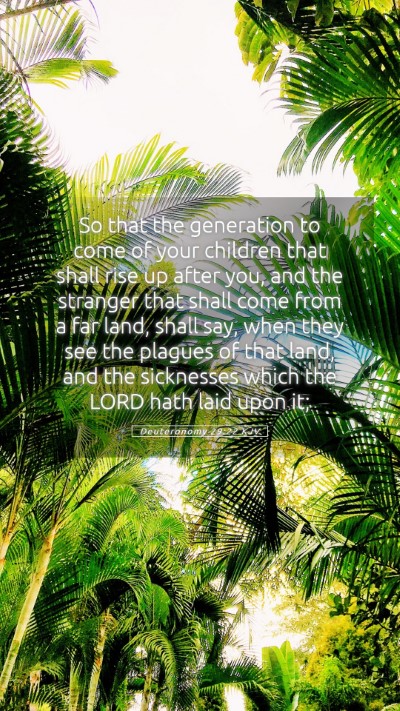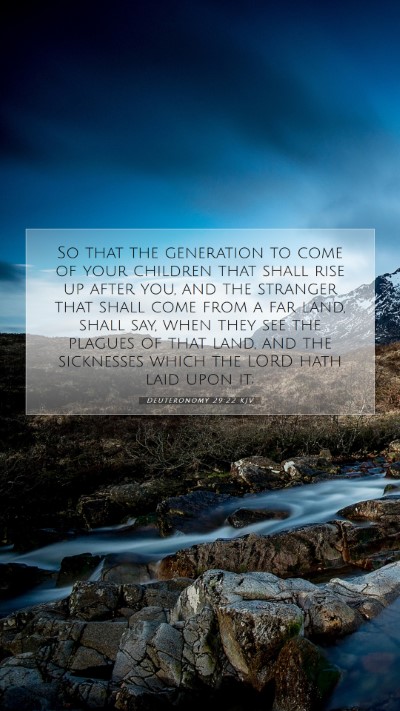Understanding Deuteronomy 29:22
Bible Verse: Deuteronomy 29:22 - "So that the generation to come of your children that shall rise up after you, and the stranger that shall come from a far land, shall say, when they see the plagues of that land, and the sicknesses which the LORD hath laid upon it;"
Bible Verse Meaning and Interpretation
The verse is a part of Moses' farewell address to the Israelites as they prepare to enter the Promised Land. It emphasizes the importance of remembering God’s dealings with their ancestors, particularly the consequences of disobedience.
1. Historical Context
This verse reflects a critical moment in Israel's history. The Israelites were on the verge of entering Canaan after decades of wandering in the desert. Here, Moses warns of the repercussions of their actions and the potential divine judgment that could fall upon them.
2. Meaning of the Verse
- Covenant Reminder: Moses is reminding the people that future generations need to be aware of their history and the covenant with God.
- Consequences of Sin: The "plagues" and "sicknesses" represent the consequences of straying from God's commandments.
- Influence on Outsiders: This verse highlights that even foreigners who see the state of the land will understand the importance of obedience to God (suggesting a lesson for all people).
Bible Verse Commentary
According to Matthew Henry, this verse serves as a cautionary tale. He points out that the consequences of national sin will be evident not just to the people themselves but also to those outside their community. The idea is that the faithfulness of God will be manifest in both blessings for obedience and curses for disobedience.
Albert Barnes expands on this by noting that the purpose of these warnings is two-fold: to instill fear of judgment in the Israelites and to offer hope that by recognizing their failures, they can return to God. He emphasizes the importance of testimony from generation to generation.
Meanwhile, Adam Clarke interprets the verse in light of the prophetic tradition. He suggests that the plagues referred to are not merely historical but serve as a warning of what can happen if the Israelites do not uphold their end of the covenant. Clarke underscores the significance of maintaining a righteous legacy.
Application of the Verse
The application of this verse goes beyond mere historical recounting; it serves as a spiritual lesson applicable to today's believers. Just as the Israelites were called to remember their past, modern Christians are encouraged to learn from Scripture, recognize the gravity of sin, and understand the importance of their relationship with God.
Practical Insights:
- Study your spiritual heritage to appreciate God’s faithfulness in your life.
- Recognize the impact of sin on communities and the importance of collective accountability.
- Use Biblical history to teach future generations about God’s expectations and the consequences of turning away from Him.
Cross References
- Deuteronomy 28:15-68: The blessings and curses associated with obedience and disobedience to God's law.
- Isaiah 1:4: The concept of a sinful nation and the burden of their iniquities.
- Jeremiah 2:19: A reminder of how one’s own wickedness can punish them, reflecting on the consequences of turning away from God.
This analysis reveals deeper insights into Deuteronomy 29:22, contributing to our Bible study insights, Bible verse commentary, and overall understanding of Scripture. Through careful examination and reflection on this verse, one can appreciate its relevance to both the ancient Israelites and contemporary readers. As we seek bible verse explanations and practical applications for our daily lives, this verse illuminates the intersection of historical context with ongoing spiritual truth.


